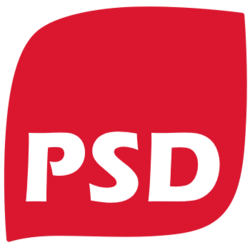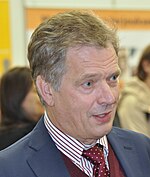Social Democratic Party (Caldia): Difference between revisions
No edit summary |
No edit summary |
||
| Line 6: | Line 6: | ||
| logo = [[File:Glytter_Social_Democrats_Logo.png|250px]] | | logo = [[File:Glytter_Social_Democrats_Logo.png|250px]] | ||
| leader = [[Stiofán Mac Suibhne]] | | leader = [[Stiofán Mac Suibhne]] | ||
| leader1_title = | | leader1_title = Secretary-General | ||
| leader1_name = | | leader1_name = Aingealag Ní Bhraonáin | ||
| founded = 1912 | | founded = 1912 | ||
| predecessor = | | predecessor = | ||
| Line 33: | Line 33: | ||
| seats3 = {{Composition bar|9|20|#EE2020}} | | seats3 = {{Composition bar|9|20|#EE2020}} | ||
}} | }} | ||
The '''Social Democratic Party''' ({{wp|Irish language|Ghaillish}}: ''Páirtí Sóisialta Daonlathach''; '''PSD'''), | The '''Social Democratic Party''' ({{wp|Irish language|Ghaillish}}: ''Páirtí Sóisialta Daonlathach''; '''PSD'''), usually referred to as just the Social Democrats (''Daonlathaigh Shóisialta'') is a {{wp|Social democracy|social-democratic}} [[List of political parties in Caldia|political party in Caldia]]. The party is the largest in [[Caldia]]'s [[Tionól|parliament]] with 218 seats in the [[[[Comhthionól Náisiúnta|lower house]]. Founded in 1912, the party is the second oldest active political party. The PSD has a close relationship with the [[Caldish Trade Union Confederation]], the largest in the country. | ||
Alongside its main rival, the [[Liberty Party (Caldia)|Liberty Party]], the PSD has been one of two parties to form a government since the 1930s. The first Social Democratic government was formed in 1935. As of 2020, there have been eight PSD taoiseachs. | |||
Traditionally, the party is committed to social democratic ideals. It supports a strong {{wp|welfare state}}, {{wp|State owned enterprise|public ownership}}, and a {{wp|social market economy}}. Starting in the 1980s, the party began to support {{wp|economic liberalism}}. This was abandoned in the 2000s and the party continued to advocate for a strong governmental role in economic and social policy. | |||
The current party leader since 2017 is [[Stiofán Mac Suibhne]], who has served as [[Taoiseach of Caldia]] since 2019. He led the party to its first electoral victory since 1997 in the [[2019 Caldish general election|2019 snap election]]. It has 23 seats in the [[Seanad Glítteann|upper-house]] and sends 9 [[Euclean Parliament#Members|MEPs]] to the [[Euclean Parliament]]. It is a member of the [[Socialist Alternative for Euclea]] and cooperates closely with other social-democratic political parties in [[Euclea]]. | |||
==History== | ==History== | ||
===Origins=== | ===Origins=== | ||
The PSD was originally founded in 1912 by the leaders of the Confederation of Ghaillish Unions as the group's political wing. Historically, the party boasts strong ties to organised labour and the nation's unions. | |||
===Post-Occupation=== | ===Post-Occupation=== | ||
=== | The Social Democrats overtook the [[Caldia Democrats (Caldia)|Caldia Democrats]] after the rise of the [[Liberty Party (Caldia)|Liberty Party]] in 1937. The party's first Taoiseach Seamus Flemming took power in 1952. Under Taoiseach Mary O'Neil, the Social Democrats established an expansive welfare state. The reforms were very costly and were targeted by Taoiseach Flowers, who moved to totally abolish the system. Taoiseach Morgan Leneghan, who was elected after Flowers, rebuilt the Caldish welfare state to be smaller and more efficient. She also launched a massive overhaul of the [[Education in Caldia|education system]], raising it to global prominence. | ||
Under Taoiseach Leneghan the party began to pursue {{wp|Third Way}} policies in order to offer what Leneghan called a "humane alternative" to the neoliberalism of the Flowers Era. As a result, the party saw massive internal discontent and eventually the more left-wing faction of the party split off to form the Industrial Labour Party. | |||
===21st century=== | |||
The Social Democrats suffered a landslide defeat in the 2002 Comhthionól election and Leneghan was taken out in a leadership coup. Since then, the party has begun to abandon its neoliberal platform and moved farther left. It has not formed a government since 2002 and faced its fourth consecutive defeat in the 2017 general election. The party saw a rough campaign under [[Darragh Ballíck]], who began feuding with the unions over his electoral alliance with the Greens. | |||
==Leaders== | ==Leaders== | ||
[[File:Sauli Niinistö.jpg||thumb|right|150px|[[Stiofán Mac Suibhne]], the current party leader]] | [[File:Sauli Niinistö.jpg||thumb|right|150px|[[Stiofán Mac Suibhne]], the current party leader]] | ||
* | *Fionntán Mac an Oighre (April 1912 - June 1932) | ||
* | *Tomás Mag Fhearadhaigh (June 1932 - June 1942) | ||
* | *Colmán Mac Carthaigh (June 1942 - June 1947) | ||
*[[Seamus Macaulay]] (June 1947 - June 1957) | *[[Seamus Macaulay]] (June 1947 - June 1957) | ||
*[[Máire Ní Néill]] (June 1957 - May | *[[Máire Ní Néill]] (June 1957 - May 1972) | ||
*[[ | *[[Ruairí Mac Ailín]] (May 1972 - September 1975) | ||
*[[Mícheál Ó Muilleoir]] (September 1975 - June 1982) | |||
*[[Mícheál Ó Muilleoir]] ( | |||
*Fíona Nic Chonsaidín (June 1982 - 1987) | *Fíona Nic Chonsaidín (June 1982 - 1987) | ||
*[[Niamh Nic Uilliamn]] (June 1987 - August 2001) | *[[Niamh Nic Uilliamn]] (June 1987 - August 2001) | ||
*[[Séamus Ó Faoláin]] (August 2001 - June 2002) | *[[Séamus Ó Faoláin]] (August 2001 - June 2002) | ||
* | *Fionnbharr Mac Seáin (June 2002 - June 2007) | ||
*Mícheál Ó Domhnaill (June 2007 - June 2012) | *Mícheál Ó Domhnaill (June 2007 - June 2012) | ||
*[[Darragh Ballíck]] (June 2012 - June 2017) | *[[Darragh Ballíck]] (June 2012 - June 2017) | ||
| Line 66: | Line 71: | ||
==Social Democratic Taoiseachs== | ==Social Democratic Taoiseachs== | ||
*Tomás Mag Fhearadhaigh (March 1935 - June 1937) | |||
*Seamus Macaulay (June 1952 - June 1957) | *Seamus Macaulay (June 1952 - June 1957) | ||
*Máire Ní Néill (June 1962 - | *Máire Ní Néill (June 1962 -June 1972) | ||
*Rory Mac Ailín ( | *Rory Mac Ailín (June 1972 - March 1975) | ||
*Mícheál Ó Muilleoir (June 1977 - June 1982) | *Mícheál Ó Muilleoir (June 1977 - June 1982) | ||
*Niamh Nic Uilliam (June 1992 - March 2002) | *Niamh Nic Uilliam (June 1992 - March 2002) | ||
Revision as of 02:56, 19 February 2020
This article is incomplete because it is pending further input from participants, or it is a work-in-progress by one author. Please comment on this article's talk page to share your input, comments and questions. Note: To contribute to this article, you may need to seek help from the author(s) of this page. |
Social Democratic Party Páirtí Sóisialta Daonlathach | |
|---|---|
 | |
| Leader | Stiofán Mac Suibhne |
| Secretary-General | Aingealag Ní Bhraonáin |
| Founded | 1912 |
| Headquarters | Síocháin Building Spálgleann, Caldia |
| Youth wing | Young Social Democrats |
| Membership (2015) | 65,612 |
| Ideology | Social democracy Democratic socialism |
| Political position | Centre-left |
| Euclean Parliament group | Socialist Alternative for Euclea |
| Colours | Red |
| Seanad Glítteann | 23 / 60
|
| Comhthionól Náisiúnta | 218 / 399
|
| Euclean Parliament | 9 / 20
|
The Social Democratic Party (Ghaillish: Páirtí Sóisialta Daonlathach; PSD), usually referred to as just the Social Democrats (Daonlathaigh Shóisialta) is a social-democratic political party in Caldia. The party is the largest in Caldia's parliament with 218 seats in the [[lower house. Founded in 1912, the party is the second oldest active political party. The PSD has a close relationship with the Caldish Trade Union Confederation, the largest in the country.
Alongside its main rival, the Liberty Party, the PSD has been one of two parties to form a government since the 1930s. The first Social Democratic government was formed in 1935. As of 2020, there have been eight PSD taoiseachs.
Traditionally, the party is committed to social democratic ideals. It supports a strong welfare state, public ownership, and a social market economy. Starting in the 1980s, the party began to support economic liberalism. This was abandoned in the 2000s and the party continued to advocate for a strong governmental role in economic and social policy.
The current party leader since 2017 is Stiofán Mac Suibhne, who has served as Taoiseach of Caldia since 2019. He led the party to its first electoral victory since 1997 in the 2019 snap election. It has 23 seats in the upper-house and sends 9 MEPs to the Euclean Parliament. It is a member of the Socialist Alternative for Euclea and cooperates closely with other social-democratic political parties in Euclea.
History
Origins
The PSD was originally founded in 1912 by the leaders of the Confederation of Ghaillish Unions as the group's political wing. Historically, the party boasts strong ties to organised labour and the nation's unions.
Post-Occupation
The Social Democrats overtook the Caldia Democrats after the rise of the Liberty Party in 1937. The party's first Taoiseach Seamus Flemming took power in 1952. Under Taoiseach Mary O'Neil, the Social Democrats established an expansive welfare state. The reforms were very costly and were targeted by Taoiseach Flowers, who moved to totally abolish the system. Taoiseach Morgan Leneghan, who was elected after Flowers, rebuilt the Caldish welfare state to be smaller and more efficient. She also launched a massive overhaul of the education system, raising it to global prominence.
Under Taoiseach Leneghan the party began to pursue Third Way policies in order to offer what Leneghan called a "humane alternative" to the neoliberalism of the Flowers Era. As a result, the party saw massive internal discontent and eventually the more left-wing faction of the party split off to form the Industrial Labour Party.
21st century
The Social Democrats suffered a landslide defeat in the 2002 Comhthionól election and Leneghan was taken out in a leadership coup. Since then, the party has begun to abandon its neoliberal platform and moved farther left. It has not formed a government since 2002 and faced its fourth consecutive defeat in the 2017 general election. The party saw a rough campaign under Darragh Ballíck, who began feuding with the unions over his electoral alliance with the Greens.
Leaders

- Fionntán Mac an Oighre (April 1912 - June 1932)
- Tomás Mag Fhearadhaigh (June 1932 - June 1942)
- Colmán Mac Carthaigh (June 1942 - June 1947)
- Seamus Macaulay (June 1947 - June 1957)
- Máire Ní Néill (June 1957 - May 1972)
- Ruairí Mac Ailín (May 1972 - September 1975)
- Mícheál Ó Muilleoir (September 1975 - June 1982)
- Fíona Nic Chonsaidín (June 1982 - 1987)
- Niamh Nic Uilliamn (June 1987 - August 2001)
- Séamus Ó Faoláin (August 2001 - June 2002)
- Fionnbharr Mac Seáin (June 2002 - June 2007)
- Mícheál Ó Domhnaill (June 2007 - June 2012)
- Darragh Ballíck (June 2012 - June 2017)
- Stiofán Mac Suibhne (July 2017 - Present)
Social Democratic Taoiseachs
- Tomás Mag Fhearadhaigh (March 1935 - June 1937)
- Seamus Macaulay (June 1952 - June 1957)
- Máire Ní Néill (June 1962 -June 1972)
- Rory Mac Ailín (June 1972 - March 1975)
- Mícheál Ó Muilleoir (June 1977 - June 1982)
- Niamh Nic Uilliam (June 1992 - March 2002)
- Séamus Ó Faoláin (March 2002 - June 2002)
- Stiofán Mac Suibhne (February 2019 - Present)